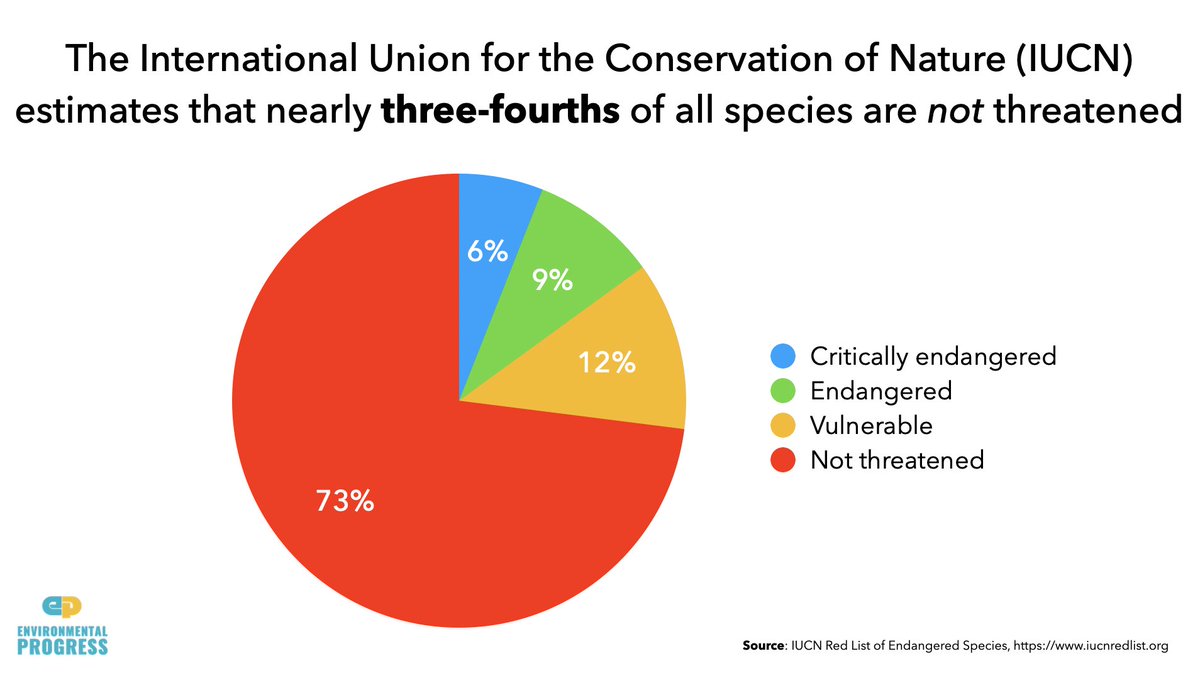
If climate change is worsening disasters, high-intensity fires, & mass extinction (ie 75% species) then why
- are disaster deaths at their lowest in 120 years?
- do high-intensity fires become low-intensity ones in well-managed forests?
- are 73% of species *not* threatened?



- are disaster deaths at their lowest in 120 years?
- do high-intensity fires become low-intensity ones in well-managed forests?
- are 73% of species *not* threatened?




I have been accused of being wrong about disasters, fires, and extinctions, and of course I might be: I have been wrong before. More than once. And I am human.
But when I have been shown to be wrong, I have not only admitted it, I have explained why & how I was wrong, in detail.
But when I have been shown to be wrong, I have not only admitted it, I have explained why & how I was wrong, in detail.
I was wrong about nuclear energy. I thought we didn't need it. I thought the waste was a huge problem. I thought many died from nuclear energy accidents.
I investigated why I was so wrong & spoke publicly about it:
I investigated why I was so wrong & spoke publicly about it:
I was wrong about renewables. I thought they would save the world from climate change. I thought they harmonized us with nature. I thought they were cheap.
I sought to understand why I was so wrong, and spoke publicly about it
I sought to understand why I was so wrong, and spoke publicly about it
I thought climate change was the world's biggest environmental problem, that the Amazon was the lungs of the world, that people's lives were better working on farms than in factories, and many other common myths
I was wrong, and wrote about them
amazon.com/Apocalypse-Nev…
I was wrong, and wrote about them
amazon.com/Apocalypse-Nev…
The experience of being wrong is humiliating & I hate it
But being wrong has also taught me to be more skeptical & to avoid rushing to judgement
Do I always do so? Of course not. Just 6 days ago I was wrong
But I immediately admitted it & apologized
But being wrong has also taught me to be more skeptical & to avoid rushing to judgement
Do I always do so? Of course not. Just 6 days ago I was wrong
But I immediately admitted it & apologized
https://twitter.com/ShellenbergerMD/status/1415386823073931272?s=20
Does that mean you should trust what I say? Of course not!
Please *don't* take my word for anything. Don't take anyone's. Be skeptical. Look at sources. Ask hard questions.
Even if you think someone has been right about some things doesn't mean they're right about everything
Please *don't* take my word for anything. Don't take anyone's. Be skeptical. Look at sources. Ask hard questions.
Even if you think someone has been right about some things doesn't mean they're right about everything
There's a reason I write books. They give you the time to really look at the evidence, and change your mind privately, when it is less humiliating to do so. I interviewed over 150 people for my forthcoming book, about half of them credentialed "experts," & read everything I could
I consider it an honor and privilege to write books, and take the responsibility extremely seriously. I try to take my tweets seriously, too, but there are many more barriers & much more time between researching/thinking/writing and publishing a book than there is tweeting.
I stand by what's in Apocalypse Never, and I believe the book has held up to scrutiny.
Where we made errors, we corrected them:
environmentalprogress.org/corrections
Where we were accused of being wrong, we responded with evidence:
environmentalprogress.org/fact-checking-…
Where we made errors, we corrected them:
environmentalprogress.org/corrections
Where we were accused of being wrong, we responded with evidence:
environmentalprogress.org/fact-checking-…
We even corrected the book for facts that changed *after* we had gone to press
Ten days after it was published, IUCN changed its classification of a whale species from "endangered" to critically endangered
fisheries.noaa.gov/feature-story/…

Ten days after it was published, IUCN changed its classification of a whale species from "endangered" to critically endangered
fisheries.noaa.gov/feature-story/…


In my late 20s & early 30s I did activist publicity for various progressive, environmental, & social justice causes
I wrote about these efforts in Apocalypse Never & in my forthcoming book
I quit that work after I lost confidence in the people I was working for
I wrote about these efforts in Apocalypse Never & in my forthcoming book
I quit that work after I lost confidence in the people I was working for
I am still proud of much of the work I did back then, but when and where I have changed my mind, I have explained, at length, in my writings and talks, why & how I was wrong
I promise to keep doing so by presenting the best available evidence:
environmentalprogress.org/apocalypse-nev…
I promise to keep doing so by presenting the best available evidence:
environmentalprogress.org/apocalypse-nev…
• • •
Missing some Tweet in this thread? You can try to
force a refresh





